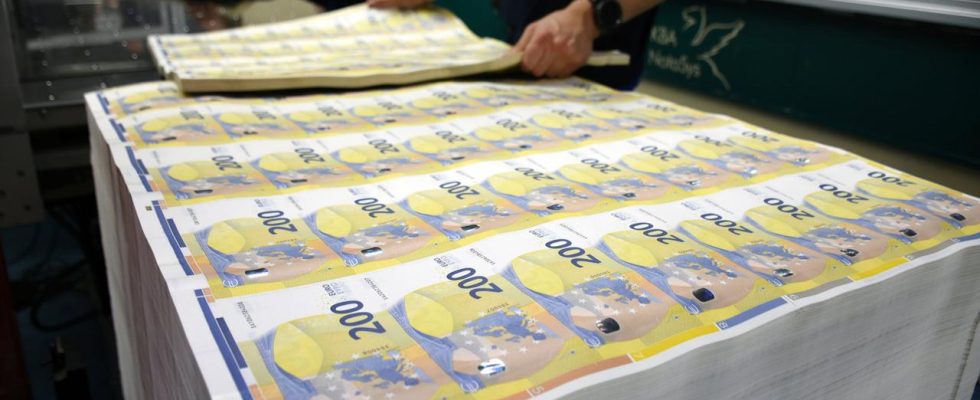background
It sounds paradoxical: In everyday life, more and more people are paying by card or electronically. Nevertheless, there are hundreds of billions of euros in cash in circulation. Where is all the money?
The proportion of cash transactions in everyday retail has been falling for years. More and more people are paying by card. According to a study by the European Central Bank (ECB), Germany is in the upper midfield of Europe with around 60 percent of cash transactions. In the Nordic countries and the Netherlands, more payments are made digitally than in cash. Nevertheless, there are enormous quantities of banknotes in circulation: at the end of last year there were printed banknotes worth 1,570 billion euros. With checking and credit card accounts, who needs that much money?
A study by the Bundesbank shows that in Germany only around a tenth of cash is used for real transactions. The rest is used to store values. 30 percent of cash euro values disappear in German money storage facilities, 20 percent are stashed in other European countries and 40 percent in the rest of the world.
Cash instead of an account
In the years after the financial crisis of 2008/2009, there were no or at best low interest rates for investments. If commercial banks parked their money at the Bundesbank, they even had to pay negative interest from 2014 onwards. According to a study by the ECB, the result was that banks filled their vaults with cash. It was cheaper to carry cash back and forth with your own staff and insure it than to invest virtual assets at the central bank. Private individuals also lost interest in fixed-term deposit accounts and hoarded cash at home. “With the end of the negative interest phase, the growth of banknotes in circulation has effectively come to a standstill,” says Bundesbank board member Sabine Mauderer. However, the level achieved remains high.
“The increased demand for banknotes is a typical phenomenon in times of crisis, where people rely on tried-and-tested products and place their trust in cash as fail-safe central bank money,” writes the Bundesbank in a study. When it was unclear during the lockdowns at the beginning of the pandemic whether the money supply would continue to function, large amounts of cash were hoarded.
Lots of cash abroad
In countries with high levels of corruption, poor administration and expensive and inadequate banking systems, cash is the method of choice anyway. If the national currency is also weak, the dollar and euro are trumps.
Many holidaymakers pay for their trips in Germany. Travel companies pay their local service providers cashlessly through transfers and checks. But the more exotic a destination becomes, the more cash tourists take with them. As enthusiasm for travel increases, the need for cash increases.
Money became scarce in Greece in 2015 during the crisis over the slow payment of high national debts. ATMs only made limited payments. The result was that tourists from Northern Europe brought bundles of euros with them. The Bundesbank registered a drastic increase in demand for fifties and put 22 million additional notes into circulation.
Criminal ones businesses
Official studies are silent about an obvious market for cash – the criminal economy. Drug dealers and extortionists do not work with checking accounts, but rather collect large amounts of cash. This needs to be washed. In Europe it is therefore becoming increasingly difficult to deposit money into accounts. From 10,000 euros, embarrassing questions are asked. Laws are currently being prepared in the EU that will generally limit cash transactions to 10,000 euros.
In order to curb money laundering, the ECB has stopped issuing 500 euro notes for five years. As a result, demand for 100 and 200 euro notes increased. An evaluation by the Bundesbank shows that these large bills are paid out by banks far more often than they are deposited there. So they disappear into money storages.
How cash leaves the EU
Amounts of 10,000 euros or more must be declared when crossing the border. The “Financial Intelligence Unit” of German customs registered fewer than 500 cases of attempted money smuggling in 2022. The hits show that the network has big holes. Seven out of ten reports came from airports where luggage is examined more closely. One in four cases were discovered during police checks on cars. In only five cases were dubious amounts of cash found on railway trains. The customs evaluation unit does not provide any amounts for this. A case involving 25,000 euros is described as exemplary.
Amounts of cash are being transported to countries that are not meticulous. Turkey and the Balkan states are considered popular and easily accessible. At the beginning of February, a traveler bound for Istanbul was caught at Munich Airport with 1.4 million euros in his suitcase. A money counting machine was seized from his apartment.

